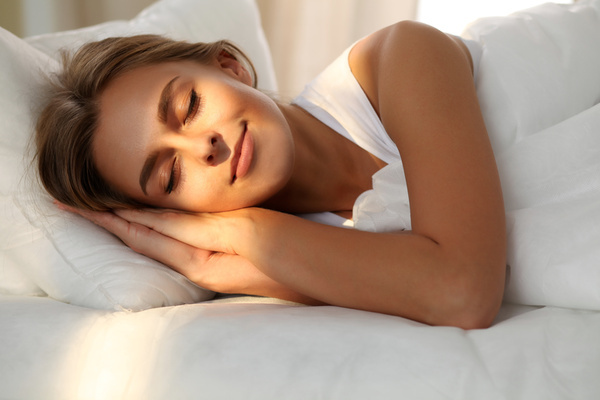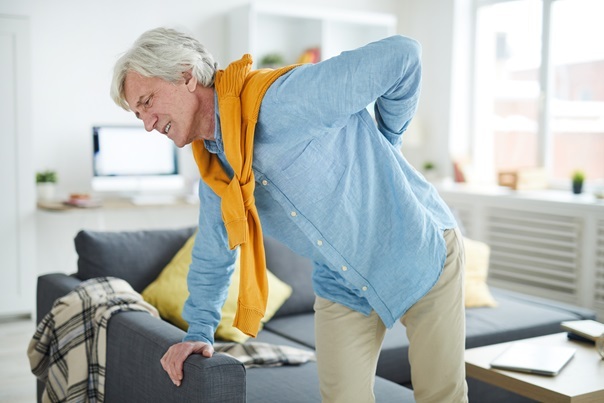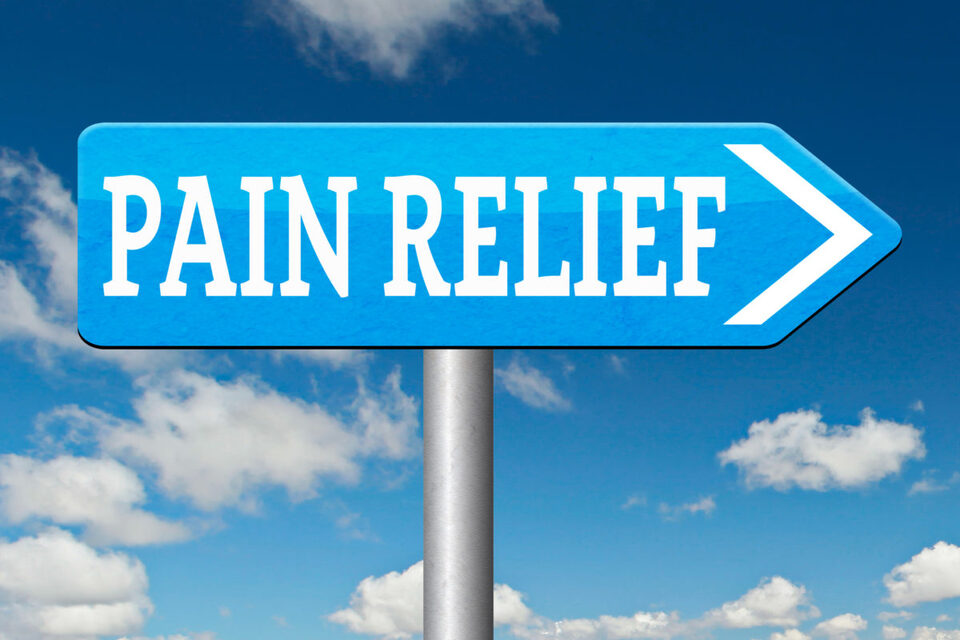
Fibromyalgia and Sleep: What’s the connection?
Sleep: the ultimate reset switch. We’ve got tons of research about just how important sleep is to our long-term health and well-being. It turns out that between 67% and 88% of people who deal with long-term pain also have trouble sleeping well. Poor sleep, in this way, is both a cause and effect of pain.
Fibromyalgia (FM) is a common chronic pain condition that is rather infamous for how poorly it is understood. This is in large part because FM is a syndrome composed of many factors, rather than a single disease entity. In fact, beyond pain, people with FM may experience any combination of fatigue, gastrointestinal symptoms, functional impairment, cognitive dysfunction, anxiety, depression, stiffness, interstitial cystitis/painful bladder syndrome and endometriosis among others.
One of the factors that has been most studied and best understood is the role of low quality and quantity of sleep, especially REM sleep. REM sleep is a kind of sleep that occurs at intervals during the night and is characterized by rapid eye movements and more dreaming.
Before we can get into “what to do about it”, it’s important to spend a little bit of time understanding why this sleep/pain connection is so strong. Having a better understanding of why you’re in pain increases your chances of getting out of pain. This is important, as feeling empowered to help ourselves is essential to making the types of changes that will have a lasting impact on pain symptoms.
Without the right levels of REM Sleep and Deep/Slow-wave sleep, our bodies are simply unable to regenerate effectively. Sleep deprivation impacts many areas of the brain that have a role in pain, including: opioid processing, neurotransmitter production (like serotonin), immune function, melatonin production, the endocannabinoid systems, and the hypothalamus-pituitary-adrenal axis.[i]
This is a challenge, as approximately 80% of adults who deal with FM have some level of insomnia (difficulty sleeping).[ii] [iii] While it is true that being in pain can directly influence the ability to sleep soundly, it’s also true (and sometimes surprising to people) that poor sleep is itself a factor in chronic pain. In fact, clinical trials show that some of the medications that reduce the pain of FM act in part by improving sleep quality. [iv] [v] [vi] Since the majority of people with FM have trouble sleeping, most people reading this article can attest to the experience of “waking unrefreshed”, where the duration of sleep seems to have been sufficient but the quality of sleep was anything but restorative. Research shows that quality of sleep is a far better indicator than the amount of time spent in bed or the amount of hours of sleep. [vii] In fact, as we’ll discuss later, it turns out that spending more time in bed when it doesn’t lead to quality rest may actually be detrimental.
Another challenge with judging our own sleep patterns is that the experience can be very subjective. While most people can feel when they didn’t get into “deep sleep” during the course of a night, objective data from sleep studies confirms that people with FM have longer duration of waking after sleep onset, shorter sleep duration, and spend more time in light sleep. [viii]
Finally, it seems that individual preferences for when we prefer to go to bed and wake up may impact the severity of FM pain. Known as our “chronotype”, every person has their own unique set point when it comes to when our bodies are inclined to seek rest. Although these chronotypes result from some combination of genetics and lived experience, it seems that people who tend to prefer staying up late and waking later (known as “eveningness” in studies, based on the Morningness-Eveningness Questionnaire) have higher likelihood of having pain from FM. A recent study attributes as much as 21.9% of the variability in FM severity to this one factor alone.[ix]
So, now that we’ve established the fact that it’s hardly rare to experience sleep issues while dealing with FM, we can move into understanding what to do about it.
What impacts how well you sleep?
It’s helpful first to understand the 2 main factors that contribute to how well a person sleeps during the night. (Note: everyone has their own unique factors, and a full work-up by a sleep specialist is often warranted)
To better understand these 2 concepts, let’s image a bucket used for carrying water. Now, imagine that after a long and restful night of sleep, a person’s bucket is completely full in the morning. As they go about their day, the water in the bucket is depleted until it is completely empty in the evening. In a perfect world, that bucket would be completely empty (and thus the person ready for bed) exactly when that person would like to go to sleep. If the bucket was emptied sooner than this time, the person may want to go to bed earlier than appropriate. Now, if the bucket still has some water remaining in it at bedtime, it may be hard to fall asleep or stay asleep. Finally, imagine that the same bucket also tends to be easier to fill or empty as specific times of the day. This example illustrates two very important concepts: Sleep Drive and your biological “clock”.
Sleep Drive
When the bucket in our example is empty, we are appropriately tired and want to go to sleep. When the bucket is full, we have energy for the day. Sleep drive is based on the concept that we should be able to fall asleep when we’ve depleted our reserves. At these times, your head should hit the pillow and you should be able to fall asleep deeply and quickly. When we take naps during the day or stay in bed when you’re not trying to sleep, we tend to fill the bucket at inappropriate times. A fuller bucket can lead to more trouble falling asleep in the evening. Of course, if this were the only factor involved, everyone would be able to fall asleep when they are sufficiently tired (and we know that this is not the case).
Your Biological “Clock”
The reason that this is not always the case for everyone is that our bodies have a very fine-tuned preference for when we should be asleep and when we should be awake. Also known as the “circadian rhythm”, this idea of the clock is the reason why our buckets are better at filling and emptying at different times of the day. Most people have experienced the fact that if you try to go to sleep when your biological clock is “confused”, it is much harder to do so (think about what happens when traveling to a different time zone and having jet lag). If you were tired enough, in theory you should be able to fall asleep at any time. However, our bucket often has a mind of its own, and it prefers to be full and empty at very specific times. Specifically, our biological clocks prefer to be set to sleep at night and be awake during the day.
Unless we honor and address these two specific processes, it may be difficult to fall asleep, stay asleep, and get a good quality of sleep.
Four Rules for Better Sleep
In order to help you understand further, there are 4 important rules that should be followed (Source: Clinical Management of Insomnia with Brief Behavioral Treatment (BBTI)[x]:
- Reduce your time in bed
- Wake up at the same time of day every day, no matter how poorly you slept the night before
- Don’t go to bed unless you are sleepy
- Don’t stay in bed unless you are asleep.
Reduce your time in bed
Often times, people end up spending many more hours in bed than they do actually sleeping – and this may limit their ability to sleep well when they actually intend to do so. While this may seem like a counterintuitive idea (why would someone who has trouble sleeping avoid being in bed, as being in bed provides an opportunity to grab sleep whenever possible) it is well based in research. You should only use your bed for nighttime sleep (and sex), as doing other activities while awake in bed can make it harder for your body to understand when it is time for sleep. This means that avoiding naps, staying in bed to read or watch TV, having conversations (especially stressful ones).
Wake up at the same time of day every day, no matter how poorly you slept the night before
We are creatures of habit. As a result of the biological/circadian clock discussed previously, the more changeable your sleep schedule is throughout the week, the less successful you’ll be at getting quality sleep at the right time. Sometimes people try to “catch up” on sleep when they have the opportunity, thinking that this is healthy for the body. Instead, all it does is damage the biological clock (and confuse the bucket’s ability to predict when it is best to be empty and when it is time to fill up). This is because when you wake up is the most important factor in setting the clock to the right time. Pick a time and stick to waking up at the time, every day (even on weekends).
Don’t go to bed unless you are sleepy
People who deal with insomnia (and especially those with chronic pain), often describe feeling tired but not necessarily “sleepy”. This is an important difference, and one that you should check in with yourself on. It may be helpful to keep a sleep diary for several days, making note of when you feel tired or fatigued (usually a physical sensation or one of exhaustion), and when you feel sleepy (eyes heavy, ready for bed). Going to bed specifically when your biological clock intends for you to is key. For most people, getting to bed well before midnight, and rising for the way before 8am is ideal (but, of course, may not be appropriate for all).
Don’t stay in bed unless you are asleep
If you’ve followed the previous 3 rules to the letter, and get in bed but still are unable to fall asleep, there’s one more often counterintuitive idea to remember: if you cannot fall asleep within 15 minutes, don’t push it. Get up, break the cycle, do something else that is peaceful and quiet (get out of bed to read a book, if you can, for example). After enough time passing (15-30 min should be sufficient), try going back to sleep and give it another 15 minute try. Repeat, as needed, until you are successful.
Foundational sleep hygiene recommendations
In addition to the above rules, there are a few more important concepts to understand and steps you can incorporate at your own pace to improve the likelihood of restful sleep:
- Stimulants: Avoid stimulants after dinner or stimulating activity (mental or physical) 2 hours before bed. Avoid drinking coffee or other caffeinated beverages after 1pm if you have trouble sleeping. For some, ditching coffee altogether may be necessary (some people can be impacted for up to 24 hours by just one cup). While coffee may have some benefit and is not an issue for everyone, consider reducing your intake if you have sleep issues. As alcohol can be a stimulant, those who have trouble sleeping should avoid alcohol before bed and see how that helps them feel. Similarly, try to avoid highly stimulating activity of all kinds, including exercise and stressful conversation right before bed.
- Fluids: On that note, if you wake to urinate often during the night, see if reducing your intake of fluid 3 hours before bedtime reduces this need
- Power down: Turn off devices that emit “blue light”, such as the light emitted from TVs, telephones, and iPads. This light has been shown to block the production of the all-important sleep hormone melatonin.
- Black out: Try to keep your sleep environment as dark as possible, as any light from the outside interferes with our circadian rhythms. Whenever this is not possible, sleeping masks may be recommended.
- Snacks: Though eating before bed is not generally recommended, those who wake often in the middle of the night may benefit from a small snack high in protein (think a small handful of healthy nuts) to help stabilize their blood sugar throughout the night. It is also helpful to avoid eating very spicy foods
- Unwind and let go: Choose something relaxing (a warm bath, light reading, calm conversation with a loved one) to add to your bedtime routine (but remember, not actually IN bed). Set your intention on releasing the stresses of the day and remember that with the next morning comes a new opportunity to work toward your goals. Accept what has transpired today, and make an effort to be present in the moment at hand in order to create a more fulfilling tomorrow.
- Keep cool to sleep cool: studies show that a slightly cooler room can be helpful in achieving restful sleep. 65-68 degrees Fahrenheit is often a helpful starting point.
- Tricks to sleep: use thought stopping and breath counting to silence worries and transition into a restful night of sleep. Also consider a mindfulness based Progressive Muscle Relaxation, like the one that can be found here.
Supplements that improve sleep
In addition to the above foundational techniques, people searching for natural treatments for insomnia often turn to supplements. It is best to consult with someone with sufficient training in making personalized recommendations, such as a Naturopathic Physician or similar allied health professional.
Some patients find relief from nutrients like magnesium, tryptophan, 5-HTP, Vitamin B6, and phosphatidylserine. The reason these substances only work for some people is that they work on varying parameters of sleep and thus should only be started with proper guidance after a thorough assessment of the cause of sleep challenges. There’s also interest in botanical medicines for sleep support, and some people find relief from herbs such as passionflower, valerian, hops, and chamomile. Many are finding hemp-derived CBD products helpful.
Whichever natural substances are used, it is important to address foundational lifestyle changes such as sleep hygiene, stress, diet, digestion and exercise first or in parallel with additional sleep support.
Don't miss out on important articles about pain management. Sign up for our newsletter now!
 Dr. Robert Kachko (Naturopathic Doctor, Licensed Acupuncturist) is Inner Source Health's expert in Cardiometabolic risk reduction and chronic pain. A leader in the fields of Naturopathic and Integrative Medicine, Dr. Kachko has combined the core principles of Western and Eastern approaches to care into a comprehensive biopsychosocial methodology for people dealing with chronic disease. An advocate for healthcare reform, he's the incoming President of the American Association of Naturopathic Physicians (AANP), and currently serves on the Board of Directors for the organization. A native of New York, he has also served on the Board of Directors of the New York Association of Naturopathic Physicians. Dr. Kachko is also Founder of TribeRx, a comprehensive technology-enabled solution for people dealing with chronic pain. His practice is located in Manhattan.
Dr. Robert Kachko (Naturopathic Doctor, Licensed Acupuncturist) is Inner Source Health's expert in Cardiometabolic risk reduction and chronic pain. A leader in the fields of Naturopathic and Integrative Medicine, Dr. Kachko has combined the core principles of Western and Eastern approaches to care into a comprehensive biopsychosocial methodology for people dealing with chronic disease. An advocate for healthcare reform, he's the incoming President of the American Association of Naturopathic Physicians (AANP), and currently serves on the Board of Directors for the organization. A native of New York, he has also served on the Board of Directors of the New York Association of Naturopathic Physicians. Dr. Kachko is also Founder of TribeRx, a comprehensive technology-enabled solution for people dealing with chronic pain. His practice is located in Manhattan.
References
[i] Haack M. Sleep deficiency and chronic pain: Potential underlying mechanisms and clinical implications. Neuropsychopharmacology : official publication of the American College of Neuropsychopharmacology. 06/2019. doi: 10.1038/s41386-019-0439-z.
[ii] Baker S, McBeth J, Chew-Graham CA, Wilkie R. Musculoskeletal pain and co-morbid insomnia in adults; a population study of the prevalence and impact on restricted social participation. BMC Fam Pract 2017;18:17.
[iii]S.A. Jacobson, R.G. Simpson, C. Lubahn, C. Hu, C.M. Belden, K.J. Davis, L.R. Nicholson, K.E. Long, T. Osredkar, D. LortonCharacterization of fibromyalgia symptoms in patients 55–95 years old: a longitudinal study showing symptom persistence with suboptimal treatment Aging Clin. Exp. Res., 27 (1) (2014), pp. 75-82
[iv] D.J. ClauwFibromyalgia: a clinical review JAMA, 311 (15) (2014), pp. 1547-1555
[v] S. Straube, S. Derry, R.A. Moore, H.J. McQuayPregabalin in fibromyalgia: meta-analysis of efficacy and safety from company clinical trial reports Rheumatology, 49 (4) (2010), pp. 706-715
[vi] M. Spaeth, M. Rizzi, P. Sarzi-PuttiniFibromyalgia and sleep Best Pract. Res. Clin. Rheumatol., 25 (2) (2011), pp. 227-239
[vii] R.J. Anderson, C.S. McCrae, R. Staud, R.B. Berry, M.E. RobinsonPredictors of clinical pain in fibromyalgia: examining the role of sleep J. Pain, 13 (4) (2012), pp. 350-358
[viii] Wu Y. Sleep disturbances in fibromyalgia: A meta-analysis of case-control studies. Journal of psychosomatic research. 05/2017;96:89-97. doi: 10.1016/j.jpsychores.2017.03.011.
[ix] Türkoğlu G. The relationship between chronotype, sleep disturbance, severity of fibromyalgia, and quality of life in patients with fibromyalgia. Chronobiology international. 11/2019:1-14. doi: 10.1080/07420528.2019.1684314.
[x] Troxel WM, Germain A, Buysse DJ. Clinical Management of Insomnia with Brief Behavioral Treatment (BBTI). Behavioral sleep medicine. 2012;10(4):266-279. doi:10.1080/15402002.2011.607200.










